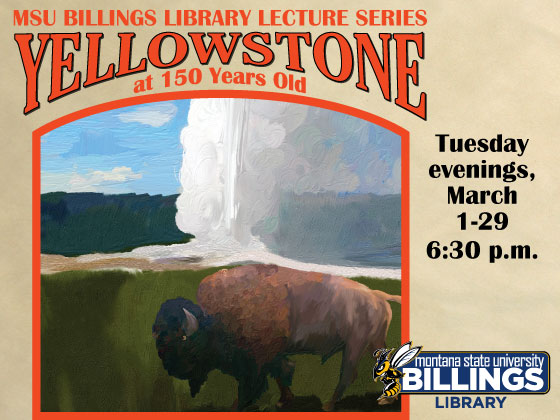Yellowstone at 150
MSUB Library Lecture Series, Spring 2022.
All Lectures are Tuesdays Evenings from 6:30 - 8:00 pm
Free event parking MSUB Parking Garage.
Free and open to the public.
March 1, 1:00 pm - MSUB Library 2nd Floor, Main Entrance
Yellowstone National Park 150th Birthday Celebration
March 1, 6:30 pm - Petro Theatre
The Cavalry Comes to the Rescue: The Army Era in YNP - Dr. Tom Rust
You can view a recording of Dr. Rust's presentation at MSUB Library Lecture Series: The Cavalry Comes to the Rescue: The Army Era in YNP
In 1883 Congress charged the US Army with managing Yellowstone National Park, created only eleven years before. The situation in the park had deteriorated and its natural features and wildlife were endangered with wanton destruction by tourists and poachers. Some politicians felt that the national park experiment had failed and advocated selling the park to the public. The arrival of the army brought order to the park, but soldiers encountered work they were untrained for in a daunting physical and social environment where they weren’t particularly welcome. Yet, when they departed in 1918, they had laid the foundation for a new sort of serviceman: the National Park Service Ranger, laying a foundation for what the national parks would become today.
Biography
Dr. Tom Rust, is a native Montanan and a Professor of History at MSUB, having taught here since 1999. He earned his BA in History from the University of Minnesota in 1992. He has both an M.A. in history from the University of Denver and an M.Ed. in curriculum and instruction from Montana State University Billings. He earned his Ph.D. from the University of Leicester in 2006. He has publications on diverse topics from Ancient Rome to the American West including the books Lost Fort Ellis: A Frontier History of Bozeman, Montana, 1867-1886 (History Press) and most recently Watching Over Yellowstone: The U.S. Army’s Experience in America’s First National Park, 1886-1918 (University of Kansas Press, 2020). He has conducted historical and archaeological research in the American West.
March 15, 6:30 pm - Petro Theatre
Women and Fly Fishing in Yellowstone - Brandi Burns
You can view a recording of Ms. Burns' presentation at MSUB Library Lecture Series: Women and Fly FIshing in Yellowstone
As a gateway community to Yellowstone National Park, West Yellowstone serves as a resting spot, a refueling spot, and a recreation jumping-off point. But it is also home, a community of residents coming together. Women were, and still are, pillars of West Yellowstone and have been exploring, recreating, and working in the community from the beginning. From fly fishers, business owners, and the beanery queens of the railroad, these women carved out a life in this remote area of Montana and provide important stories to examine, in light of, the 150th anniversary of Yellowstone National Park.
Biography
Brandi Burns is the executive director of the Yellowstone Historic Center, which operates the Museum of the Yellowstone in West Yellowstone, MT. Burns received her Bachelor of Arts from Idaho State University and her Master’s from Boise State University. Burns spent twelve years as the City Historian in Boise, Idaho, where she focused her research on the American West, women’s history, and the field of public history. Currently, she serves as the chair of the Public History Committee of the Organization of American Historians, and her previous speaking engagements include academic conferences; RootsTech, the world’s largest genealogy conference; and numerous community presentations.
March 22, 6:30 pm - Library 148
Yellowstone Volcanism and Monitoring - Dr. Madison Myers
You can view a recording of Dr. Myers presentation at MSUB Library Lecture Series: Yellowstone Volcanism and Monitoring
Yellowstone volcano has produced two super-eruptions within its 2.2-million-year lifetime. However, it is much more likely that the next volcanic event in the region will be a lava flow. This talk will review how volcanologists learn about the volcanic past of Yellowstone and go over the techniques used to monitor such a large system.
Biography
Dr. Madison Myers is an Assistant Professor in Earth Sciences at Montana State University. Her research focuses on investigating how magma accumulates at depth, what triggers it to erupt, and the timescale(s) of the eruption dynamics. She has just received a large grant to study Yellowstone's youngest super-eruption, which will engage over 30 Montana State University students in research opportunities.
March 29, 6:30 pm - Petro Theatre
Hiking through a Grizzly history in the Greater Yellowstone Ecosystem - Brett French
You can view a recording of Brett's presentation at MSUB Library Lecture Series: Hiking through a Grizzly history in the Greater Yellowstone Ecosystem
Grizzly bears have been praised and villainized, hunted to near extinction by early settlers and venerated by Native Americans and conservation groups. Such are the contradictions of the largest predator in the lower 48 states. Now concentrated largely in two populations near Glacier and Yellowstone national parks, the big bruins face heightened scrutiny as the federal government considers turning over grizzly bear management to states. Because of their growing populations, grizzlies also face new threats including increasing urbanization of wildlands and heightened outdoor recreation, in some cases by people unaccustomed to playing in predator country. How we deal with the species will be another defining moment in American conservation history.
Biography
Montana native Brett French has worked as a journalist across the Northwest for the past 37 years, most recently as the Outdoor editor at the Billings Gazette newspaper. His writing has also appeared in state, regional and national magazines. When not tickling his computer keys at work he can be found rafting the Stillwater River’s rapids or hiking in the Beartooth Mountains with his wife and two adult children.
April 5, 6:30 pm - Library 148 (postponed from March 8, 2022)
Yellowstone Revealed: Celebrating an Ancient and Enduring Indigenous Connection - Dr. Shane Doyle
You can view a recording of Dr. Doyle's presentation at MSUB Library Lecture Series: Yellowstone Revealed: Celebrating an Ancient and Enduring Indigenous Connection
Archaeological evidence and oral traditions indicate that Native people have been living within and around today’s Yellowstone Park for at least the past 12,600 years, and they continue to maintain a strong cultural connection to that remarkable region of their homeland.
Dr. Shane Doyle will review noteworthy examples of this ancient Indigenous presence in the Upper Yellowstone Region and provide a more complete picture of the unique impact that the people had on the place, and the wondrous place had on the people who have called it home since before the last Ice Age.
Biography
Dr. Shane Doyle, Apsaalooke, is an educational and cultural consultant based in Bozeman, MT. Shane is a curriculum designer, researcher, performance art producer, and environmental advocate, who is helping to lead the commemoration of Yellowstone's 150th with the installation of Intertribal Teepee Village near Gardiner in August of 2022.


